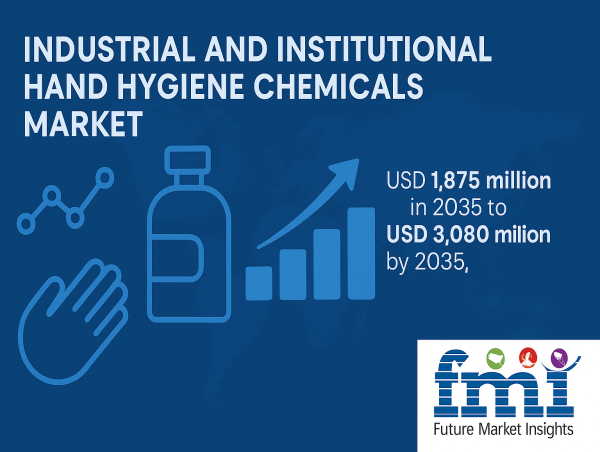𝐔𝐧𝐝𝐞𝐫𝐬𝐭𝐚𝐧𝐝𝐢𝐧𝐠 𝐭𝐡𝐞 𝐌𝐚𝐫𝐤𝐞𝐭 𝐚𝐧𝐝 𝐭𝐡𝐞 𝐒𝐡𝐢𝐟𝐭 𝐓𝐨𝐰𝐚𝐫𝐝 𝐈𝐧𝐧𝐨𝐯𝐚𝐭𝐢𝐨𝐧
Traditionally, the industrial hand wash chemicals market has focused on rapid action and broad-spectrum antimicrobial performance. The COVID-19 pandemic only amplified this focus, driving mass adoption of alcohol-based disinfectants and foaming hand soaps in institutional settings. However, this demand surge has also revealed several limitations—skin irritation, resistance development, and environmental impact—which have opened the door to innovation. This is where enzymatic cleaners enter the frame, promising a novel way to rethink hygiene chemistry in sensitive industrial and institutional environments.
𝐌𝐚𝐤𝐞 𝐈𝐧𝐟𝐨𝐫𝐦𝐞𝐝 𝐃𝐞𝐜𝐢𝐬𝐢𝐨𝐧𝐬 – 𝐀𝐜𝐜𝐞𝐬𝐬 𝐘𝐨𝐮𝐫 𝐒𝐚𝐦𝐩𝐥𝐞 𝐑𝐞𝐩𝐨𝐫𝐭 𝐈𝐧𝐬𝐭𝐚𝐧𝐭𝐥𝐲! https://www.futuremarketinsights.com/reports/sample/rep-gb-1791
𝐖𝐡𝐚𝐭 𝐀𝐫𝐞 𝐄𝐧𝐳𝐲𝐦𝐚𝐭𝐢𝐜 𝐇𝐚𝐧𝐝 𝐇𝐲𝐠𝐢𝐞𝐧𝐞 𝐂𝐡𝐞𝐦𝐢𝐜𝐚𝐥𝐬?
Enzymatic cleaners use biologically active proteins that catalyze the breakdown of organic matter, rather than simply killing pathogens. In hand hygiene formulations, enzymes such as proteases, lipases, and amylases help dissolve residual proteins, fats, and carbohydrates on the skin—substances that often harbor bacteria and viruses. Unlike alcohol-based hand sanitizers that work through denaturation, enzymatic agents function through biochemical decomposition, targeting the root causes of contamination rather than just the symptoms.
These agents are particularly effective in settings where organic residue is prevalent, such as food processing plants, laboratories, or healthcare facilities dealing with wound care. In contrast to QACs or triclosan-based institutional hand cleaning agents, enzymatic formulations are less likely to contribute to antimicrobial resistance, offering a strategic advantage in long-term hygiene planning.
𝐑𝐞𝐚𝐥-𝐖𝐨𝐫𝐥𝐝 𝐀𝐩𝐩𝐥𝐢𝐜𝐚𝐭𝐢𝐨𝐧𝐬 𝐀𝐜𝐫𝐨𝐬𝐬 𝐇𝐢𝐠𝐡-𝐑𝐢𝐬𝐤 𝐒𝐞𝐜𝐭𝐨𝐫𝐬
In the healthcare sector, enzymatic hand hygiene disinfectant solutions are increasingly used in surgical prep rooms and isolation wards. A study published in the Journal of Hospital Infection demonstrated that enzymatic formulations reduced biofilm formation by up to 70% compared to alcohol rubs. One notable example is the use of multi-enzyme hand foams in pediatric oncology wards at a German hospital, where reduced skin irritation and higher compliance rates among staff were reported.
In food processing facilities, enzymatic hand sanitizing formulations are showing promise in ensuring both safety and comfort. A major poultry processing plant in Brazil recently integrated a dual-enzyme cleanser into their hygiene protocol, reporting a 40% reduction in microbial counts on workers’ hands despite heavy organic contamination. Unlike abrasive soaps that can damage skin barriers, enzymatic cleaners maintain skin integrity while improving hygiene outcomes.
Even in pharmaceutical cleanrooms, where sterile environments are non-negotiable, enzymatic hand cleaning agents are being tested for pre-gowning sanitation routines. Companies like Ecolab and Novozymes are already investing in the R&D of such solutions, underscoring the growing industry interest in this niche.
𝐔𝐧𝐥𝐨𝐜𝐤 𝐂𝐨𝐦𝐩𝐫𝐞𝐡𝐞𝐧𝐬𝐢𝐯𝐞 𝐌𝐚𝐫𝐤𝐞𝐭 𝐈𝐧𝐬𝐢𝐠𝐡𝐭𝐬 – 𝐄𝐱𝐩𝐥𝐨𝐫𝐞 𝐭𝐡𝐞 𝐅𝐮𝐥𝐥 𝐑𝐞𝐩𝐨𝐫𝐭 𝐍𝐨𝐰: https://www.futuremarketinsights.com/reports/industrial-and-institutional-hand-hygiene-chemicals-market
𝐔𝐧𝐜𝐨𝐦𝐦𝐨𝐧 𝐀𝐝𝐯𝐚𝐧𝐭𝐚𝐠𝐞𝐬 𝐅𝐮𝐞𝐥𝐢𝐧𝐠 𝐓𝐡𝐞𝐢𝐫 𝐆𝐫𝐨𝐰𝐭𝐡
Perhaps the most compelling advantage of enzymatic hand hygiene chemicals lies in their biodegradability and skin compatibility. Unlike ethanol or chlorhexidine-based products, which can be harsh and drying, enzymes work at physiological pH and temperature, minimizing damage to the skin’s natural flora. This results in better user experience and higher frequency of usage, especially in institutions with repeated handwashing protocols.
Another underappreciated benefit is the ability to target biofilms. Biofilms are complex communities of microorganisms that adhere to surfaces—and skin—protected by a self-produced matrix. Most traditional disinfectants have limited effect against biofilms, but enzymatic solutions can penetrate and dismantle this matrix, making them especially valuable in infection-prone zones.
Moreover, enzymatic products are non-volatile, reducing the inhalation risks associated with alcohol-based or strongly fragranced chemical agents, a factor increasingly relevant in indoor workspaces prioritizing occupational health.
𝐌𝐚𝐫𝐤𝐞𝐭 𝐎𝐮𝐭𝐥𝐨𝐨𝐤 𝐚𝐧𝐝 𝐁𝐚𝐫𝐫𝐢𝐞𝐫𝐬 𝐭𝐨 𝐀𝐝𝐨𝐩𝐭𝐢𝐨𝐧
Despite these advantages, the market penetration of enzymatic hand hygiene solutions remains limited. One major barrier is lack of awareness. Many procurement teams in institutional settings continue to favor familiar, cost-effective sanitizing agents over novel technologies. Additionally, regulatory frameworks in many regions have yet to establish clear guidelines for enzyme-based disinfectants, which slows down product approvals and commercialization. According to Future Market Insights, the market is projected to grow from USD 1,875 million in 2025 to USD 3,080 million by 2035, expanding at a CAGR of 5.2% during the forecast period.
However, as sustainability becomes a core driver in chemical procurement and hygiene strategy, enzymatic formulations are poised to benefit. The increasing pressure on manufacturers to reduce VOCs (volatile organic compounds) and support skin-safe, green chemistry is nudging the market toward diversification. Industry watchers anticipate that enzymatic products may capture a growing niche, particularly in applications where traditional products fall short.
𝐈𝐧𝐝𝐮𝐬𝐭𝐫𝐢𝐚𝐥 𝐚𝐧𝐝 𝐈𝐧𝐬𝐭𝐢𝐭𝐮𝐭𝐢𝐨𝐧𝐚𝐥 𝐂𝐡𝐞𝐦𝐢𝐜𝐚𝐥𝐬 𝐈𝐧𝐝𝐮𝐬𝐭𝐫𝐲 𝐀𝐧𝐚𝐥𝐲𝐬𝐢𝐬: https://www.futuremarketinsights.com/industry-analysis/industrial-and-institutional-chemicals
𝐀 𝐐𝐮𝐢𝐞𝐭 𝐘𝐞𝐭 𝐏𝐨𝐰𝐞𝐫𝐟𝐮𝐥 𝐄𝐯𝐨𝐥𝐮𝐭𝐢𝐨𝐧
The Industrial and Institutional Hand Hygiene Chemicals Market is entering a phase of subtle transformation. While alcohol-based and QAC-based products will likely continue to dominate in terms of volume, enzymatic hand hygiene solutions are carving out a space where efficacy, safety, and sustainability intersect. Their unique biochemical mechanism, combined with advantages like skin compatibility and biofilm disruption, positions them as not just alternatives but essential upgrades in hygiene-critical industries.
As research, regulation, and awareness catch up, enzymatic cleaners may emerge from the shadows and become a new standard—proving that the future of hand hygiene lies not just in killing germs, but in understanding and managing the invisible ecosystems of our skin with precision and care.
𝐊𝐞𝐲 𝐒𝐞𝐠𝐦𝐞𝐧𝐭𝐚𝐭𝐢𝐨𝐧
By State of the Product:
- Solid State
- Liquid State
- Paper-based (Liquid imbibed in solid)
- Gel-based
By Product Type:
- Regular Soaps
- Antibacterial Soaps
- Industrial Heavy-duty Soaps
- Sanitizers
- Alcohol-based
- Non-alcohol-based
- Protectors (Barrier Creams, etc.)
- Restorers (Moisturizers, etc.)
- Others
By Purpose of Products:
- Antiseptic
- Antimicrobial
By End-use Verticals:
- Food & Beverage
- Pharmaceutical & Healthcare
- Retail
- Manufacturing Units and Industrial Services
- Educational Institutions
- Office Work Spaces
- Others (Agriculture, Forestry, etc.)
By Region:
- North America
- Latin America
- Europe
- South Asia & Pacific
- East Asia
- Middle East & Africa
𝐑𝐞𝐥𝐚𝐭𝐞𝐝 𝐑𝐞𝐩𝐨𝐫𝐭𝐬:
Benzalkonium Chloride Market: https://www.futuremarketinsights.com/reports/benzalkonium-chloride-market
Antistatic Brush Market: https://www.futuremarketinsights.com/reports/antistatic-brush-market
Encapsulant Material for PV Module Market: https://www.futuremarketinsights.com/reports/encapsulant-material-for-pv-module-market
Para Toluene Sulfonic Acid Market: https://www.futuremarketinsights.com/reports/para-toluene-sulfonic-acid-market
Agricultural Fumigant Market: https://www.futuremarketinsights.com/reports/agricultural-fumigant-market
𝐀𝐛𝐨𝐮𝐭 𝐅𝐮𝐭𝐮𝐫𝐞 𝐌𝐚𝐫𝐤𝐞𝐭 𝐈𝐧𝐬𝐢𝐠𝐡𝐭𝐬 (𝐅𝐌𝐈)
Future Market Insights, Inc. (ESOMAR certified, recipient of the Stevie Award, and a member of the Greater New York Chamber of Commerce) offers profound insights into the driving factors that are boosting demand in the market. FMI stands as the leading global provider of market intelligence, advisory services, consulting, and events for the Packaging, Food and Beverage, Consumer Technology, Healthcare, Industrial, and Chemicals markets. With a vast team of over 400 analysts worldwide, FMI provides global, regional, and local expertise on diverse domains and industry trends across more than 110 countries. Join us as we commemorate 10 years of delivering trusted market insights. Reflecting on a decade of achievements, we continue to lead with integrity, innovation, and expertise.
𝐂𝐨𝐧𝐭𝐚𝐜𝐭 𝐔𝐬:
Future Market Insights Inc.
Christiana Corporate, 200 Continental Drive,
Suite 401, Newark, Delaware - 19713, USA
T: +1-347-918-3531
For Sales Enquiries: [email protected]
Website: https://www.futuremarketinsights.com
LinkedIn| Twitter| Blogs | YouTube
Ankush Nikam
Future Market Insights Global & Consulting Pvt. Ltd.
+ +91 90966 84197
email us here
Visit us on social media:
Other
Legal Disclaimer:
EIN Presswire provides this news content "as is" without warranty of any kind. We do not accept any responsibility or liability for the accuracy, content, images, videos, licenses, completeness, legality, or reliability of the information contained in this article. If you have any complaints or copyright issues related to this article, kindly contact the author above.
![]()




